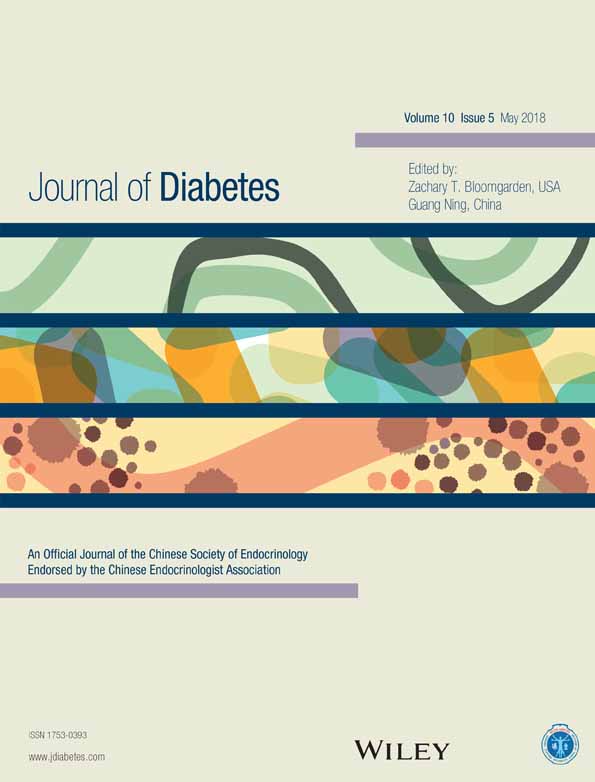Zinc supplementation in prediabetes: A randomized double-blind placebo-controlled clinical trial†
糖尿病前期补充锌治疗:一项随机双盲安慰剂对照临床试验
Abstract
enBackground
This study evaluated the effects of zinc supplementation on glycemic control, other cardiometabolic and anthropometric parameters, and disease progression in prediabetes.
Methods
A randomized double-blind placebo-controlled Phase 2 clinical trial was conducted over a 12-month period in 200 subjects (43% male; mean [± SD] age 51.8 ± 7.3 years), randomly assigned (1: 1) to the treatment or control group. The treatment group received zinc (20 mg daily). Subjects were evaluated at baseline and at 1, 3, 6, and 12 months. The primary outcome was the change in glycemic control from baseline. Multiple regression analyses were performed, with change in outcome variables after intervention from baseline used as continuous dependent variables.
Results
In both groups, mean serum zinc concentrations prior to the trial were below normal (15.29–21.41 μmol/L). During the 12-month follow-up, a significantly higher percentage of participants developed type 2 diabetes in the control compared with zinc-treated group (25.0% vs 11.0% respectively; P = 0.016). Fasting plasma glucose (FPG), 2-h glucose levels in the oral glucose tolerance test (OGTT), homeostasis model assessment of insulin resistance (HOMA-IR), total cholesterol (TC), and low-density lipoprotein cholesterol (LDL-C) were significantly lower in the treated group, with significant improvement in β-cell function. In all four regression models, the best predictor of the dependent variables (i.e. change in FPG, 2-h glucose in the OGTT, HOMA-IR, and homeostatic model assessment of β-cell function) was zinc treatment.
Conclusions
Zinc supplementation reduced blood glucose and insulin resistance while improving β-cell function. Furthermore, supplementation reduced disease progression to diabetes and had beneficial effects on TC and LDL-C.
Abstract
zh摘要
背景
这项研究评估了补充锌治疗对糖尿病前期患者的血糖控制、其他心脏代谢与人体测量学指标以及疾病进展的影响。
方法
这是一项为期12个月的随机双盲安慰剂对照的2期临床试验, 纳入了200名受试者(43%为男性;平均[± SD]年龄为51.8 ± 7.3岁), 将他们随机(按照1:1比例)分配到治疗组或者对照组。治疗组接受补充锌治疗(每日20 mg)。在基线以及第1、3、6、12个月时对受试者进行了评估。主要结果为血糖控制从基线以来的变化情况。进行多元回归分析, 评估干预后从基线以来的结果变量(视为连续性因变量)变化情况。
结果
两组受试者在试验前的平均血清锌浓度都低于正常值(15.29-21.41 µmol/L)。在为期12个月的随访期间, 对照组与补充锌治疗组相比明显有更高比例的参与者发生了2型糖尿病(分别为25.0%与11.0%;P = 0.016)。治疗组中的空腹血糖(FPG)、口服葡萄糖耐量试验(OGTT)的2小时血糖水平、稳态模型评估的胰岛素抵抗(HOMA-IR)、总胆固醇(TC)以及低密度脂蛋白胆固醇(LDL-C)都显著更低, 并且β细胞功能也有显著的改善。在所有的4种回归模型中, 因变量(亦即FPG、OGTT的2小时血糖、HOMA-IR以及稳态模型评估的β细胞功能变化)的最佳预测因子为补充锌治疗。
结论
补充锌治疗可以降低血糖与胰岛素抵抗, 同时改善β细胞的功能。此外, 补充锌治疗还可以延缓患者进展为糖尿病, 并且对TC与LDL-C也具有有益的影响




